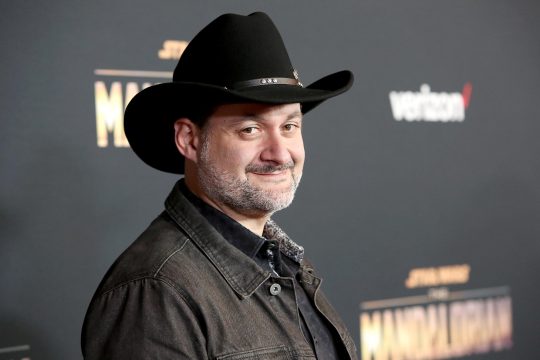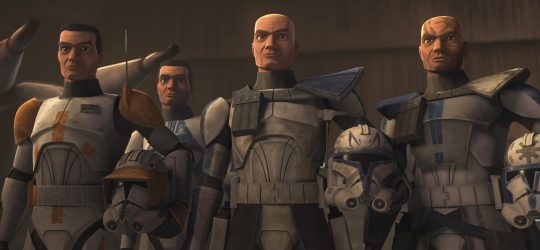#love all the DIRECT rebels callbacks in the ahsoka scripts
Photo


Clone Wars EP Dave Filoni breaks down the first episodes of the final season [x]
It’s been a long journey in a galaxy far, far away, but Star Wars: The Clone Wars is finally back. After its unexpected cancellation in 2013, fans had a new hope for the revered series. At Star Wars Celebration in 2015, audience members got to see rough animations (story reels) of a few unfinished episodes, including a plot focusing on imperfect clone soldiers called the Bad Batch. Those episodes make up the first arc of the seventh and final season, which debuted Feb. 21 on Disney+. After the premiere of the first two episodes, EW spoke with Clone Wars and The Mandalorian executive producer Dave Filoni about bringing back the series — and a fallen friend.
ENTERTAINMENT WEEKLY: When you produced the first six seasons, the pace of production was pretty quick. But for this season, you had years to look back and reflect on the story. As you were looking to bring back these first few episodes was there anything you really wanted to go back and update?
DAVE FILONI: If you go back to the original series, what we put out in 2008, it's such a dramatic leap. But then you realize it's been 11 years since that show first aired, which is kind of striking for me that it's been so long. So there should be dramatic improvements, visually. I think that facial animation, the fidelity of the expression — things like that — we were able to improve in the animation itself. I really feel looking at this show now, it's kind of how >George [Lucas] and I envisioned it to look in the beginning. We just didn't have the tools necessary to actually realize it then. But over time with a lot of training, you know, like any good Jedi I learned my way.
One scene that's a little different from the original story reel of “The Bad Batch” is that it originally opened with a longer extended sequence between Mace, Anakin, Rex, and Cody. In the final version, you added a pretty touching scene between Rex and Cody talking about a lot of the fallen clones. What was the decision to add that scene in there?
I just thought the story was really dragging in the beginning. I felt like there was a whole lot of exposition, one too many scenes where they're saying what they're going to do instead of just doing it. And then I wanted to add a better sense of personal stakes to the story. You know, part of the consideration I had to make when doing this was, how do people even know who Echo is? I'm imagining a lot of people will just watch these 12 episodes and maybe not go back and watch the previous, you know, over 100 episodes where Echo plays a moderate role.
The Bad Batch are mutant clones who are new faces we meet at the top of the season. How did you go about designing the looks for these guys and also new clone hairstyles that I didn’t know were possible?
Yes, we always had this bizarre hairstyle trend with clones where they would pick ways to individualize. And the Bad Batch themselves, that was all right from George. He wanted to explore this idea that there were clones that were a little bit more unique from one another that were like a special forces unit that had enhanced skills. And so the trick for those characters is really making them feel special in what their abilities could be, but not making them superheroes. Wrecker should not be the Hulk, even though we love the Hulk and those types of stories. That's not what Star Wars is. So we had to keep it all kind of within the reality of Star Wars.
I loved the callback to clone 99 from season 3. Was that always the plan to call the Bad Batch "Clone Force 99"?
Yeah. That's where the idea kind of came from story-wise, was that, you know, 99 proved back in the original Clone Wars series to have greater heart and strength than some of the clones that were thought of better warriors, and Cody felt that that was worth exploring. And so he really lobbies the Kaminoans to take a second look at clones that they might deem different.
These first two episodes feature almost entirely clone troopers. Dee Bradley Baker voices all the clones — what was his reaction when he saw the script?
He has a unique skill where he's able to lend his voice to the individual nature of these characters. You forget it's one guy doing it. And I can tell you, it's exhausting for him. Being inside one character's mind is exhausting. And I can't imagine what it's like when he's in a whole squad of guys. And he's got to keep the energy up and he's got to keep the conflict up. And he's arguing with himself.
He and I over the years have had different ways to remember clones. When we were in the series we had certain words that would be like triggering for each of the clones — what their key personality was. The Bad Batch is a little easier, you know, because they're so different.
I think one of the coolest scenes that has ever come out of Clone Wars is the attack on the command center in episode 1 of this season. Do you remember plotting that out?
Yeah, that was really well-directed by Kyle Dulevy. George was always pushing us to think more in terms of what the live-action blocking would be and how a live-action film could do things. And that's where some of those longer takes that hand off action and keep with movement and feel more handheld and operated come from. It's the way to really put the viewer right in there, like you're running alongside the clones.
The way we do Clone Wars, there's no storyboards. So when we plan the scene like that, it's all virtually blocked in the computer. All the staging is done in a privatized system George created called Zviz, which is like a virtual blocking tool for directors. And you can put all the characters on the stage and then you can watch them play out the scenes like you’re watching the morning walkthrough of the rehearsal run, and then you can set up your cameras and so you can follow everybody. There's this virtual camera, and you can tweak the timing to get it to be really perfect.
The animator, Kyle, and his team were really proficient at using it. I know exactly the shot you're talking about. The way I look at it in my mind is that the Bad Batch arc is the most authentic to the way I think Clone Wars was back when we did it. Yes, we improved the animation. We improved the rendering. But it's very much something that we had shot. It's pretty authentic. The middle arc is more of a halfway point, where we tweaked it and we worked on the script quite a bit, but it's still the relative idea of what we were going to be doing cinematically. And then the end is really something like we've never done before in Clone Wars — because it’s the end.
It was so great to see Echo again despite the circumstances. When he seemingly died in the Citadel, did you know then that you wanted to bring him back later?
No, ha. That [death], really more than any of the other ones, we all kind of noticed that people were like, “Oh, man, Echo.” And we thought it'd be interesting that the Techno Union — a creepy bunch of guys on the evil side of things — maybe there's something to be done there. So we started to hatch a plan for if that would even be something that's possible. But it wasn't top of mind when we did the Citadel arc.
Another difference between the story reels in the second episode was this new scene about Anakin slipping away to call Padme, which I thought was a pretty illuminating addition.
When I looked at these 12 episodes, there was no Padme in them, and that seemed like a really huge oversight. That was never the plan, because there were more episodes planned, but we ended up doing these 12. I just thought that was really unfortunate. I talked to the actress who played her, Cat Taber, and I think it was a bummer for her because she'd been so involved in the series over the years.
And again, [this new scene] is important to the story and for people that might be walking into Clone Wars new. Having a scene with Padme actually interacting with Anakin was a very important moment. It also shows people where they're at in their relationship. It shows that he goes to her for advice, that she really gets the relationship he has with Rex, that she needs to remind him that actually that was going out on a limb for him, so maybe you should take it on faith and go on this limb for Rex. And also that she has a big influence over Anakin still and that he trusts her. And it also hints at the timeline. And that's always a tricky one, I think, because you as the viewer have to remember that at this point in Star Wars, we know way more than the characters do.
To be honest, I'd worked so much on Rebels, I had to go back and reread and watch a whole bunch of the Clone Wars era just to turn my brain back on. I had to upload a whole bunch of information to my drive because, you know, I guess I'm getting old and losing some of it, but it came back in time.
You posted an intriguing Instagram last month. It was a picture of Gandalf and Ahsoka. And Gandalf says, “People thought I was dead, too. Look how that turned out…” And, you know, a lot of people assumed Asoka was dead because we hear her voice in The Rise of Skywalker. Are we going to see her again?
Well, you'll see her in Clone Wars if you watch these 12 episodes. [Laughs] I told the truth! I had an answer for once.
Was there anything that you learned from working on and directing in this first season of The Mandalorian that you were able to apply to this final season of Clone Wars?
I think a lot. Working with Jon Favreau has been another extension of my education. There are a lot of things that George had taught me over the years about live-action, and finally here I was in a place where I could apply it. And I'm so fortunate to be working alongside Jon as another mentor and someone who is very experienced to help me through the questions and the challenges that you have in a different medium.
But yeah, it definitely affected me as far as looking back on the Clone Wars with different eyes and saying we could tighten this up, this could be better. You know, some of the things I learned from Jon about just keeping it moving and heightening and transforming things as we go. He brings a great perspective, and one that I've really never had as an actor to every scene and the emotions and the character. And so I've learned a lot from him in the past year about hopefully improving our performances and relating to performances.
277 notes
·
View notes